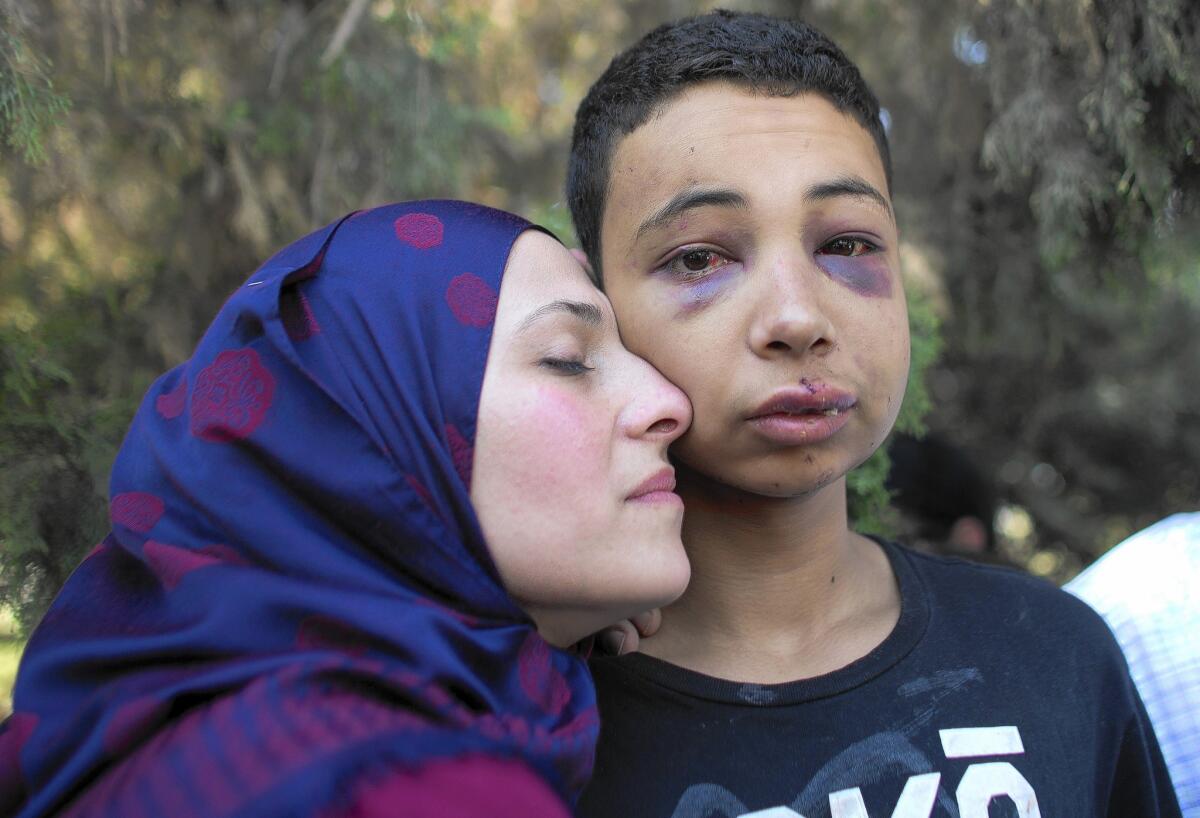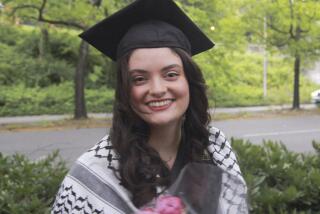Israel arrests 6 in connection with Palestinian teen’s slaying

- Share via
Reporting from JERUSALEM — Israeli authorities on Sunday arrested six suspects in connection with the gruesome killing of a Palestinian teenager from Jerusalem, and police seemed to confirm Palestinian suspicions and Israeli fears that the killers were Jewish extremists seeking revenge for the recent slayings of three Israeli teenagers in the West Bank.
“We must all be ashamed,” Finance Minister Yair Lapid said.
News of the arrests sent shock waves through Israeli society and reignited fierce protests throughout Jerusalem and much of the rest of the country, with demonstrators hurling rocks and firebombs and clashing with police.
“The murder of a child is reprehensible, regardless of the religion or nationality of the child,” said President Shimon Peres, who vowed that the killers would receive no special treatment.
Extending condolences to the Palestinian family, Prime Minister Benjamin Netanyahu similarly pledged that the “perpetrators of this horrific crime” would face the full severity of the law. “There is no place for such murderers” in Israeli society, he said.
Netanyahu spoke in Nof Ayalon after a condolence visit to the family of Naftali Frenkel, one of three yeshiva students abducted and killed in the West Bank.
Speaking to reporters outside a courthouse, the Palestinian victim’s father, Hussein Abu Khdeir, demanded that the killers’ homes be demolished — a common Israeli punishment for the families of Palestinian militants. During a search last week, Israeli forces blew up the Hebron home of a suspect in the deaths of the three Israeli teens.
“I am asking Bibi Netanyahu to do what he did in Hebron. Let’s see what he does,” Abu Khdeir said.
The charred body of 16-year-old Mohammed Abu Khdeir was found in a wooded Jerusalem area early Wednesday, shortly after witnesses reported that he was coerced into a car that sped away in the Palestinian neighborhood of Shuafat.
Tensions remained high, as hundreds of people, including Palestinian Authority Prime Minister Rami Hamdallah, continued to arrive at a large mourning tent in Shuafat.
Separately, Israel carried out an airstrike Sunday in the Gaza Strip, killing at least six members of the Palestinian organization Hamas, according to Palestinian reports. More than 150 rockets have been fired at Israel from Gaza since the three Jewish teens were killed three weeks ago.
Police spokesman Micky Rosenfeld confirmed that the suspects in Mohammed’s killing were arrested Sunday and that police had “strong indications the background was nationalistic.”
Many other details remained under a judicial gag order but were widely reported by Israeli media without attribution to official sources.
According to Channel 2, Israel’s domestic security agency, Shin Bet, arrested the six young Jews, among them three minors, in their homes in Jerusalem, the nearby settlement of Adam and the town of Beit Shemesh.
One suspect reportedly confessed to the killing and implicated others, describing how the victim was beaten in the car and later burned.
An autopsy performed Thursday revealed the boy was still breathing when he was burned to death, according to the Palestinian attorney general.
In court Sunday in the city of Petah Tikva, the suspects were remanded to custody, with a judge ruling that five of them should be held for an additional eight days, and a sixth for five days pending the filing of formal charges.
Shin Bet blocked them from meeting with lawyers, in keeping with a law permitting the government to withhold counsel for up to 10 days when suspects are charged in cases involving national security.
Also Sunday, 15-year-old Tariq Abukhdeir, an American cousin of the victim, was conditionally released from police custody amid widespread condemnation of his brutal beating, allegedly at the hands of police during protests in Shuafat on Thursday.
The State Department issued a statement, using unusually sharp language to reiterate its earlier condemnation of the treatment of the young U.S. citizen. Spokeswoman Jen Psaki said the department was “profoundly troubled by reports that he was severely beaten while in police custody and strongly condemn any excessive use of force.” She called for “a speedy, transparent and credible investigation and full accountability for the apparent excessive use of force.”
The Israeli Justice Ministry said it had opened an investigation after a video claiming to capture the incident emerged.
Video also played a role in the investigation into Mohammed’s death. Detectives used footage from multiple surveillance and traffic cameras on the attackers’ lethal route, according to Israeli media reports.
Images believed to show the car used by the attackers as they approached Mohammed have been widely circulated on the Internet.
Authorities believe several of the attackers used the same car in an attempt to kidnap a young boy in the same neighborhood the previous day, but his mother caused a ruckus that attracted attention and drove them off.
The suspects are reported to be Jewish extremists who attended an ultranationalist rally and decided to kill an Arab to avenge the slayings of the Israeli teenagers in the West Bank.
Shortly after the three were buried Tuesday, one such rally in Jerusalem deteriorated into a violent brawl in which police and Palestinian passersby were assaulted.
Hours later, Mohammed was dead.
Quoting unidentified sources close to the investigation, Israeli media said the suspects do not belong to an organized ideological group and did not seek rabbinical guidance, as was sometimes the case in previous instances of Jewish terrorism.
As the country grappled with the consequences of hostility and hatred between Jews and Arabs, other voices sounded too.
In Pardes Hanna, a mixed rally protested racism and violence, saying Jews and Arabs “refuse to be enemies.”
Elsewhere, interfaith activists made plans to eat together after a Jewish-Muslim day of fasting next week.
And Jerusalem Mayor Nir Barkat brought together, at least by phone, the families of Mohammed and Naftali Frenkel — both of whom were 16 when they died. Barkat suggested a conversation between Mohammed’s father and Naftali’s uncle, Yishai Frenkel.
According to a Facebook post by the mayor, the two consoled each other for their losses.
Sobelman is a special correspondent.
More to Read
Sign up for Essential California
The most important California stories and recommendations in your inbox every morning.
You may occasionally receive promotional content from the Los Angeles Times.










